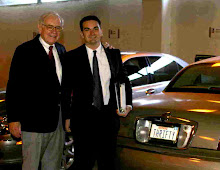What market efficiency is, and what it isn't.
The most controversial academic theory is something called Efficient Market Theory (EMT). Academics love it, real-world practitioners hate it. Why? Well, it makes life much easier researchers who can rely on the assumption that market prices are the best guess we have of true value because it means we can apply all sorts of other tests to stock prices that we otherwise couldn’t. But EMT also suggests that the real-world practitioners add no value – that a monkey throwing darts can do as good a job as they can at picking stocks. Hence the conflict. (Do you think Mr. Buffett appreciates being compared to a monkey?)
So first, I would like to clear up the most common misperception of all. Market efficiency is NOT the notion that every stock price is correct, as I often hear both students and the business press suggest. That is far too simplistic. Market efficiency is the idea that, on average, stock prices are correct and that, for any particular stock, we don’t know if it is overpriced or underpriced. The difference between these two ideas is enormous. The theory also holds that we cannot systematically choose stocks that will perform differently than the market. To me this is the crucial caveat, as it leaves open the possibility that we can unsystematically identify firms with characteristics that we feel will lead to successful investment. Alas, science has met art.
Whenever we try to value (or price) a stock, such a valuation comes with some degree of imprecision. Statisticians will call this imprecision error or residual. By definition, the sum of these errors will be zero, so we will never know whether the error with regard to a particular stock is positive or negative. Take for instance the all-but-debunked Capital Asset Pricing Model. This model suggests that a stock’s price is a function of a multiple, based on the stock’s past volatility, of the market’s “risk premium.” Everything else not explained by this multiple ends up in the error term. Since CAPM has been shown to provide little real ability to price stocks, new factors such as size and book-to-market have been added to the equation that reduce that error term.
In many cases this has made such pricing models more effective, but the obvious limitation of such models that they rely on measurable and easily accessible information. I remain of the opinion that there are times when stock prices clearly are overpriced or underpriced due to factors, like irrational exuberance, that cannot be quantified. Obvious example: the tech bubble, when the S&P 500 Composite Index temporarily sustained a P/E of over 44. Unprofitable companies like JDS Uniphase sold for $250 a share. The academic literature has struggled to make sense of this phenomenon since it happened, and thus the emergence of behavioral finance as a respected area of study coincided with this struggle. But I believe we can, in some situations, say with greater than 50% confidence that a stock price will rise at a rate greater than that of the market. Not because the book-to-market ratio or some measure of momentum dictates so, but becuase we see a firm with qualitatively positive attributes trading for less than it "should," whatever "should" means. (Passing this theory off on the financial scientists of the world is likely a futile effort that I will not make.)
Now, having said all this, let me warn everyone that to write off “market efficiency” in such a general sense is a huge mistake. Unfortunately I think many individuals unfamiliar with what exactly the term means, make blanket statements like “The market is not efficient.” As a favorite professor of mine has explained, the market should be assumed efficient until proven inefficient. Sometimes it will be inefficient, but more often than not it does a pretty good job of pricing stocks. And that is why we must be both careful and vigilant. One of my personal triumphs of late is my purchase of Coach (COH) shares early last summer at $26. The stock of this fast-growing company had fallen sharply for no real reason other than a general pessimism towards retail apparel. At $48 today, I have a nice 80% gain. (I’m not bragging, I swear!) But because the market is often very efficient, these opportunities will continue to be rare, so when we see them we must act. As Warren Buffett has advised, “Make large bets on high-probability events.”
FD: I own shares of COH, but have no position in any other stock mentioned in this post.


1 Comments:
Excellent article Andy. As a rookie investor I'm happy to add this term to my terminology.
By Tony, at 15 February, 2007 02:40
Tony, at 15 February, 2007 02:40
Post a Comment
<< Home